- About
About
Read about our values and the heart of Altitude in our About Altitude page or why not learn more about us in our team page? Our Verbier page has everything you need to know about the resort and what to do nearby.- Camps
Our Camps
We offer residential camps for 7-14 year olds as well as day camps for 3-14 year olds. For families, we offer accommodation options as well as bespoke family holiday itineraries.- Residential Camps
- Day Camps
- Activities & Excursions
- Family Adventures
- Accommodation
Accommodation
Our camps foster a home away from home feeling for children with everything they need for a safe and comfortable stay. For families, we have suitable properties for all requirements.Our camp menu
At Altitude, we take food seriously! Our campers need to be fuelled throughout the day to enjoy all their activities, so we make sure our summer camp menu is healthy, nutritious, fresh and best of all tasty, every day.
Three meals a day are prepared by our on-site chefs, who make sure they adhere to all dietary requirements of any campers for the week. There is always a meat and vegetarian option as well.
To give you an idea of the food you will get at camp, we have included an example summer camp menu below. Remember this changes from week to week, so that campers are always trying new foods that they love!
Breakfast Bar:
Our residential campers have breakfast each day at 08.00 before activities begin at 09.00. We have a ‘breakfast bar’ where children can choose from the following:
Fresh fruit platter
Croissants
Toast / bread
Nutella, jams, butter
Selection of cereals
Eggs
Cheese & Meat platter
Yoghurt
Fruit Juice, Milk, Tea
Lunch Buffet
All day campers, including those on our half-day Marmot camp, enjoy a buffet style lunch each day from 12h00. This includes a build-your-own salad bar, breads, cheese and meats each day, as well as a hot option which changes each day. Wednesdays and Saturdays are excursion days so sandwiches, crisps and fruit are taken for a lunchtime picnic.
Salad Bar (served every day)
Mixed Leaves , Tomato, Cucumber, Sweetcorn, Red Onion, Carrot, Beetroot, Cheese
Mixed salad of the day
Salad Dressing
Meat Platter
Bread
Lunch hot options:
Monday:
Jacket Potatoes
with Home Made Baked Beans, Cheese, Tuna Mayo, & Black Bean Chili
Tuesday:
Chicken and Vegetable Stir Fry
Vegetable Stir Fry
Wednesday:
Packed Lunch:
Camper’s Choice of Sandwich (Ham, Cheese, Ham & Cheese, Tuna, Egg Mayo)
Crisps
Piece of Fruit
Thursday:
Bacon Macaroni Cheese or Plain Macaroni Cheese
Peas & carrots
Friday
Beef Lasagna / Aubergine Parmigiana
Garlic Bread
Saturday
Packed Lunch:
Camper’s Choice of Sandwich (Ham, Cheese, ham & cheese, tuna, egg mayo)
Crisps
Piece of Fruit
Chalet Dinners
Dinner is served in each chalet at 18.30 and consists of a main course and dessert each day, which campers eat together with their fellow chalet-mates and evening staff. Check out our sample menu below.
Sunday
Beef Chilli with rice and nachos
Dessert:
White chocolate and raspberry cheesecake
Monday
Chicken Fajitas with vegetables, sour cream and guacamole
Dessert:
Roast peaches with vanilla ice cream
Tuesday
Sausages, mash and onion gravy with peas and carrots
Dessert:
Apple Crumble & Ice Cream
Wednesday
Beef stew with mashed potatoes, peas and carrots
Dessert:
Lemon drizzle cake
Thursday
Salmon Fish Cakes or Sweet Potato and Tofu Cakes, Steamed Rice, Greens.
Dessert:
Chocolate mousse
Friday
Homemade chicken goujons with chunky potato wedges, green beans and broccoli
Dessert:
Sticky toffee pudding and ice cream
Saturday
Make your own pizza with garlic bread and salad
Dessert:
Chocolate Brownies, Vanilla Ice Cream.
To find out more about what we offer in summer check out our Residential Camps or our Day Camps.What is a residential summer camp?
Have you ever wanted to go on a sleepover that lasted more than 1 night, or a holiday with your friends but not your parents? Residential summer camp is your home away from home! Residential camp is a place where you can make amazing memories and lifelong friends, try new activities and gain more independence being away from home, all whilst having the best time of your life! If being away from home sounds a bit intimidating, you can be sure that at a residential or ‘sleep-away’ camp you will always have a great support network. There will always either be someone else who is at camp for the first time, or you may even already have friends at camp if you went last year. You will always have someone to turn to for support and guidance whether that’s your roommate, your friend, your activity leader, your evening staff or your fellow campers! Everyone had to be a first-time camper at some point. When thinking about whether you would like to go to a residential camp, there are lots of different things to think about, which may affect which camp you would like to go to or which programme you want to join.How long are you happy to be away from home?
All over the world, different camps offer different residential or overnight camp programmes. If you are fairly new to the idea of camp then you may want to find a camp which runs ‘taster sessions’ for the weekend, however, most camps will run for a block week or two weeks as a minimum, giving you the opportunity to arrive at the weekend and then do activities for one or two weeks before returning home.Can I stay all summer?
Yes, there are camps where you can book for up to two months, which is the entire summer session! This, of course, will all depend on your age. For most summer camps, you need to be at least 7 years old to stay overnight and you can keep coming to camp as a teenager too. Often campers will start with shorter sessions and return for longer sessions as they get older. Some camps even offer a programme to allow you to train to be staff, often called worker-in- training or counsellor-in-training so the fun never stops!Will I be homesick?
Campers do sometimes feel homesick and this is perfectly normal, it is a new environment and a new experience. The camp staff will understand that sometimes you may feel homesick at some point throughout your stay. Most importantly, don’t hide this from the staff, they are there to help you and most camps will have a dedicated staff member who will be there to assist you with this.How is the day structured?
Morning: For all camps the day will start with breakfast, and then you will begin your first activity for the day. This could be a language lesson, map work, art-work, water sports, building a camp fire – the list goes on and on! Each camp will have a different rota of activities and can let you know what a normal day at camp will be like. Afternoons: Normally, around 12pm you will all group back together from your activity group to have lunch, and then after lunch, you will go for your afternoon activity. Again, this activity will depend on the type of camp you go to. For example, if you had a French lesson in the morning, during the afternoon you may go to play sports, to mix the day up. Evenings: In the late afternoon we have free time, which allows the campers (and staff!) to relax before dinner. After dinner, you will have one more activity before bed, whether that’s a talent show or bonfire. Weekends are a little different, most camps will have this as their changeover period. So depending on when you have new campers to meet and get to know, this might change the activities slightly for that day. At Altitude, we encourage campers to help to choose an activity for the day at the weekend. Maybe you had a favourite place that you would like to revisit!Will it feel like school?
When you come to camp, you are on holiday! So regardless of the programme you choose, your staff will always encourage you to learn through fun, whether that’s games or exciting activities. Most summer camps which are in an outdoor setting will encourage you to spend the entire time outside as long as the weather allows it! Even at our language camp we promote speaking as much as possible in comparison to writing and reading, this then allows the teachers to take the children outside to learn in fresh air. You’ve probably just finished a term at school when you come to camp so we know you’ve probably been inside a lot recently!How do mealtimes work?
Every camp will provide 3 meals a day, and snacks too. Breakfast, lunch and dinner will tend to be served at your base camp or ‘mess hall’ as some camps like to call it. If you are lucky enough to have day excursions at your camp you may also have the opportunity of picnic lunches or BBQ’s – you haven’t really been to camp if you didn’t toast a marshmallow over a camp fire! All camps will make sure that you are sitting with the other children and that you are not sitting alone. This is your opportunity to meet new people so make the most of it! At Altitude, we are an international camp welcoming campers from all over the world with different first languages, so we make sure that English is the main language spoken around the table. This makes sure that all children feel involved and are not left out due to language barriers. To give you an idea we have lunch all together at our day camp chalet, here we provide a healthy and nutritious lunch served with a large variety of different options in a hot and cold buffet style. Like all camps, we cater to all dietary, medical and religious requirements.Can I have my phone or iPad?
At Altitude, and as a general rule at most camps, we are a ‘no technology summer camp’. Before you panic – think again! We find this encourages children to be completely focussed on having FUN and making new friends. Therefore, not relying on or being distracted by social media/what’s happening on their phones.Will I always be very active at camp or do we have time to relax?
Most camps including ours will have designated ‘free time’ each day. This is where you can switch off for a while, relax, phone home, write letters to your family, play games or catch up with the great book you’ve been reading. We understand that a day of camp can be very exciting and full on, so this time allows campers to rewind and reflect on their day. During free time at our camp we allow teenage children (13yo +) to go into town with a small group of their camp friends. We have strict procedures in place to allow for this and we also make sure we have the parent’s permission before camp to allow you to do this. This allows our eldest children to have more independence at camp.Come and see for yourself!
Once you’ve chosen the destination and type of camp that you want to go to, you’ll soon find that as soon as you leave camp at the end of summer, you’ll be counting down the days till the start of the next year.How long are summer camps?
The answer to this question will depend on which summer camp you’re going on. So here are some questions to bear in mind when finding out how long summer camps last.When can I start summer camp, and when does it end?
June! Summer camps are based around school summer holiday dates. Therefore the majority will start towards the end of June and then finish mid or end of August each year.Are there camps running in fall, winter or spring?
Camp all year sounds great, doesn’t it?! Some camps do offer programmes all year, which are often targeted at school groups who will visit the camp for a week or weekend during term time, and also for the usual school breaks in October and March/April too. However, most summer camps operate just during the summer months as this is when the longest school holidays are, and when children can make the most of the great summer weather at camp. At Altitude, our ski school offers group ski and snowboarding day camps which follow a similar structure to the summer day camps and run from 9am – 4pm each day, and include either ski or snowboard lessons with one of our amazing instructors in the morning and afternoon, with a hot lunch included. Most of our summer camp leaders work as instructors in the winter too, so you may end up having the same staff member as summer!How long can I stay at camp for?
You can sign up for different length summer camp sessions while camp is running. Camps usually offer shorter sessions for younger or newer campers, and campers who have been going for years normally opt for longer sessions or maybe even the whole summer! The dates you can join for different length sessions may be set by the camp, and it is best to stick to these if possible, because it means you join camp on the same day as other campers and can all get to know camp and each other together, rather than joining in the middle of a session. Another big factor determining how long you can go to camp for is how old you are. If you are under the age of 6 or 7, depending on the camp, you’ll most likely only go to day camp. Usually this will be a minimum of a week sign up, but you can go for longer too! Other camps, usually those with only residential programmes, offer weekend camps to young children. This is like an introductory camp and gives children a chance to try camp before committing to a week or two week overnight session. At Altitude, we offer a perfect transition for children into residential camp. We offer a day camp which follows the same structure to the residential camp right up till 4pm, the children can try this first for a week to see if they like day camp first, and if they do, sign up to join the residential camp next year, or even the same summer if we have space!What length camp session shall I sign up for?
There are some important points to consider when you are choosing how long you would like to go to camp for. How long am I happy to be away from home for? Camp will tend to run in weekly, 2 week long, 4 week long, or even full summer sessions. This means there is a huge variation of time you can go to camp for. Maybe you’re going on a 3 week holiday, and you would like to do 2 weeks of Camp and then 1 week with your family. Maybe it’s your first time and so you would like to try for a week to see if you like it, or you already know that you LOVE camp so you know you want to spend the whole summer there with your friends! How long do I think it will take me to settle and adjust to camp life? It can take a while to settle into new surroundings, therefore if you think it’ll take you a couple days to settle in then maybe 2 weeks or more of camp is perfect for you so you can make the most of your time at camp.What programmes will the camp be offering during the time I would like to go?
Camps tend to offer their programmes on rotations. For example we offer a 2 week rotation, therefore the most common is for children to come for 1 or 2 weeks, this way they will never repeat the same activities.The camp I want to go to offers 2 different programmes that I would like to try, what should I do?
Book for 2 weeks or more! This way you can try the first week following one programme and the second week following the other.If I like the 1st week of camp, is there an option for me to extend?
If there is space in your group and chosen programme then sure! We would love to welcome you again. Bear in mind though, during peak weeks the groups will most likely be full so it’s worth for parents to check this before you come.If I am home sick, what kind of support will I receive?
There will always be a pastoral care team on hand to help you. Therefore make sure you tell a member of staff at camp, and they can help you through this. All of the above are questions that you should take time to consider the answer and also important to discuss with your parents. If you have any doubts it’s important to ask the camp staff questions so that they know the best way to help you achieve your goals at camp! But remember, you are going to camp for you! So it is important that you make the right decisions so that you can make this the best summer of your life! If you have any other questions about camp life please don’t hesitate to contact us. Camp is the best place to make new friends! Year after year, children make new friends at summer camp, and there are many returning campers who like to book into the same camp session together each year. Camp can be an exciting, fun holiday away from your parents, which you get to enjoy with your new friends.How do I start making new friends?
There are many different ways for you to make friends at summer camp. The first one is to introduce yourself – your new best friend could be sitting next to you already! You won’t be the only one whose first day it is at camp, there will always be another camper in the same position as you, why not introduce yourself while you’re waiting for everyone else to arrive, and team up with them! I know it can be scary to introduce yourself to someone but you can do it!How will camp staff help me to make friends at camp?
Your camp counsellors or team leaders will organise games and activities for you to get to know each other and make new friends straight away. Your very first day activities will be playing team building and ‘get to know you’ games or, another term for them which you may hear is ice breakers, this will be common for most camps! The staff here are helping you settle in to camp and are encouraging you to get to know them, and each other too. We add in extra challenges to help you remember your camp mates and new friend’s names! You may play these with your new bunk mates for residential camp, or in your activity groups for day camps.
What if I don’t have friends to go to activities with at first?
Camps like Altitude have set programmes, so everyone is doing the activities together in their group, and you don’t need to worry about this! Some camps you will get a free choice of activities, and maybe you don’t know anyone who is going to the same one as you from your cabin! Don’t worry, as soon as you get to an activity, the staff will make sure you’re involved in whatever they’re doing that day. Activities at camp usually involve working or playing as a team, so by joining in with activities you will make friends. At Altitude, you will be in a group of other campers of similar age with your own camp leader and tend to stay with this group at camp. For example, if you go to an activity like shelter building, you’ll soon find that you need to rely on your fellow campers to complete the activity. It’s way more fun to do these activities in a team!
What if I can’t remember everyone’s names?
Camps come in different shapes and sizes, so for really big camps, you might not know everyone’s names, and that’s OK! You don’t need to worry about not knowing everyone, because you will know the others in your dorm or bunk room, and you will know campers who are doing the same activities as you, or those you meet during mealtimes! For small camps like Altitude, you will usually end up knowing everyone’s name especially if you’re a residential camper, as everyone does activities together in the evenings. If you’ve forgotten someones name, just ask them, and they won’t mind telling you again!What if I speak a different language?
Don’t worry, at international camps or language camps, this the case for lots of campers. When campers come from all different countries, it has the added advantage that you can make friends with other children from all over the world! But if there are children from all over the world, what if they don’t speak the same language as me? Well, it’s hard to have a conversation with someone if you’re all speaking different languages! Many camps will take this into consideration when they are designing their groups/programmes. For example, at out camp we have children who speak a whole range of languages but we encourage all children to speak English together so that no one feels left out. If you don’t speak English and want to go to a camp in a different language you may find one near your home, or if there is a language that you’ve always wanted to learn, you can see if there is a camp which has lessons in your chosen language. There are also lots of camps who offer language programmes, if there is a language that you want to learn you may be able to do this at summer camp!
How can I help my child to prepare to make friends at camp?
Encouragement is key! Put yourself in your child’s shoes; going to a new camp, especially for the first time, can be really scary. However, once they’ve gone for the first day and made new friends to enjoy activities with, they’re going to feel more independent, and be so proud of themselves! Talk to your child, find out how their feeling about it. Words of encouragement and helping them get over any pre camp nerves will definitely help prepare them and make them feel more confident. Come to our summer camp and you’ll have made new friends before you know it! You may be wondering whether to send your child to camp, and whether summer camp is right for your child. We believe camp is beneficial to every child and answer a few questions about our own camp including who goes to summer camp, what age children start, and where they come from in the world.What age do children go to camp?
The age that children can go to summer camp will vary from camp to camp, and this also will be defined by the activities the camp offer. At Altitude, we have 3 different camps which children can join. This allows us to open the camp to a large variety of children of different ages, and we accept children from 3 – 14 years old. Many camps will accept children at school age, so from around 5 or 6 up to 18 years old.Can my pre-schooler join summer camp?
Yes! We welcome children from as young as 3 years old to our half-day mountain adventure style programme. This is an age specific programme which we call the ‘Marmot Camp’ for children between the ages of 3-5 years old. This is a morning-only camp, where the children come ready to leave for an activity at 9am. We will then all go in our van to an activity whether that’s pond dipping, swimming, camp fire building, mountain art, shelter building, the list is endless! After our activity we will come back to camp and re join the other campers for lunch, after lunch it’s home time at 1pm.
What ages do children join day and residential summer camp?
Once your child is 6 years old, they can join full day camp which run from 9am – 4pm, and when they’re 7 years old they can become a residential or ‘overnight’ camper. Both these camps are open to children right up to the age of 14 years old. We will still split up the camp into different age categories for activities, as we understand a 6 year old and a 14 year old are very different so will then handle the activities in different ways. Day camp schedule consists of a morning activity, lunch and then an afternoon activity before home time at 4pm, and residential campers get to enjoy an evening programme as well as the adventure of staying away from home with their new camp friends and staff.Are all the children at camp from Switzerland, or do children come from elsewhere?
At our summer camps we welcome children from all over the world. We have children from Switzerland who may be local or from Expat families, as well as children from countries such as Hong Kong, Russia, Great Britain, The Netherlands, Italy, Canada and France just to name a few! Even though the children’s native languages all differ, we ask that all children attending our camp speak English so that no one feels left out. There are summer camps all over the world, with different target audiences, and some may be international camps such as our own, whereas others may be more local. Many camps in America and Canada tend to mainly have campers from the major cities around them, and may be based on a school campus or have pick up points in local cities. This will then attract local children as it is seen as a camp which has easy access for children to get to. If the camp is linked to a school and they market themselves within the school, there is likely to then be a large number of campers attending the camp who also go to the school. If you find a camp which you like the look of and it seems to follow this set up, it may still be worth looking into. They may also have a programme to welcome international children.
Is summer camp right for my child?
We think so! Summer camp can bring great benefits to any child, and there are so many different camps out there we are confident you’ll find one to suit you. There are different types of camp, as well as different programmes on offer; for example if your child doesn’t like the idea of staying away from home yet, opt for a day camp programme! Across the board, you can easily find many camps which have based their activities round core subjects like athletic camps, adventure camps, art camps including music, water sports or academic programmes. Most camps won’t require your child to have any knowledge or experience in the activities that they’re going to participate in. For example, at our mountain adventure camp we find that allot of our kids haven’t tried a high ropes course before they come to tackle it with us. However, you will find that your camp mates and staff will always be there to help and encourage your child and you will find that they come away having learnt so much! Whilst your children are developing new skills and enjoying outdoor activities at an Altitude summer camp, there is no reason why you shouldn’t also be able to make the most of your time in Verbier in luxury summer chalets. If you’re looking for a property to base yourself at, then look no further than luxury chalet specialists, Leo Trippi, who have an extensive collection of summer chalets in Verbier with fantastic facilities for the whole family. Take a look at their top 5 summer chalet recommendations in Verbier below.Chalet Calima
 Close to Sonalon in the heights of Verbier, Chalet Calima is a beautiful four-bedroom property with magnificent mountain views, open plan living and incredible wellness facilities.
Astounding views can be enjoyed from the indoor pool which is equipped with a moveable floor to adjust the depth – ideal for children or nervous swimmers.
Floor-to-ceiling windows slide open onto a south-facing sunny terrace with outdoor hot tub – the perfect spot to unwind.
Close to Sonalon in the heights of Verbier, Chalet Calima is a beautiful four-bedroom property with magnificent mountain views, open plan living and incredible wellness facilities.
Astounding views can be enjoyed from the indoor pool which is equipped with a moveable floor to adjust the depth – ideal for children or nervous swimmers.
Floor-to-ceiling windows slide open onto a south-facing sunny terrace with outdoor hot tub – the perfect spot to unwind.
Chalet Les Étrennes
 In a private location just a short drive from Savoleyres and the resort centre, Chalet Les Etrennes provides a peaceful setting for a summer holiday.
With six en-suite bedrooms and four floors of luxury living, there is plenty of room to spread out, relax and enjoy the incredible panoramic views.
From the light and spacious living room on the top floor to an outdoor hot tub in the garden, this family-friendly chalet is a true home away from home.
In a private location just a short drive from Savoleyres and the resort centre, Chalet Les Etrennes provides a peaceful setting for a summer holiday.
With six en-suite bedrooms and four floors of luxury living, there is plenty of room to spread out, relax and enjoy the incredible panoramic views.
From the light and spacious living room on the top floor to an outdoor hot tub in the garden, this family-friendly chalet is a true home away from home.
Chalet Nyumba
 Perched above the village in the Sonalon area of Verbier, Chalet Nyumba offers commanding views across the valley, alpine-themed decor and facilities to keep the whole family entertained.
The children will be happy with a playroom equipped with countless toys and games as well as a cinema room with an extensive DVD library.
Parents can relax in the lavish spa which includes an ‘L’ shaped swimming pool with adjustable depth and counter current, outdoor hot tub, plunge pool, hammam and sauna. Adjoining the chalet is a self-contained guest mazot – ideal for any staff.
Perched above the village in the Sonalon area of Verbier, Chalet Nyumba offers commanding views across the valley, alpine-themed decor and facilities to keep the whole family entertained.
The children will be happy with a playroom equipped with countless toys and games as well as a cinema room with an extensive DVD library.
Parents can relax in the lavish spa which includes an ‘L’ shaped swimming pool with adjustable depth and counter current, outdoor hot tub, plunge pool, hammam and sauna. Adjoining the chalet is a self-contained guest mazot – ideal for any staff.
Chalet Milou
 Located on Chemin de Clambin, Chalet Milou has a traditional rustic feel yet has been updated to include many contemporary comforts.
With far-reaching views across the valley, several lounges to relax and socialise together in and an outdoor hot tub, this six-bedroom chalet has everything you need to enjoy a summer holiday in the Swiss Alps.
Located on Chemin de Clambin, Chalet Milou has a traditional rustic feel yet has been updated to include many contemporary comforts.
With far-reaching views across the valley, several lounges to relax and socialise together in and an outdoor hot tub, this six-bedroom chalet has everything you need to enjoy a summer holiday in the Swiss Alps.
Chalet Toundra
 Situated on the south-facing side of Verbier close to Savoleyres, Chalet Toundra is a superb property sleeping up to 10 guests.
Combining fantastic views with an alpine-inspired interior, the chalet has a laid-back feel with a wrap-around balcony for soaking up the sun.
The children’s bunk room is a total delight and there are a further three tastefully-appointed double bedrooms to choose from.
To enquire about renting a luxury chalet in Verbier this summer ask the Altitude Team when booking your camp, or contact sales@leotrippi.com or visit www.leotrippi.com for further inspiration.
Across the world there are countless numbers of summer camps, these come in various shapes and sizes, such as sports or language camps, and from camps with 50 campers to 500 campers! You could be looking for a camp local to you or an international camp, or you may need a camp which caters to your child’s specific needs. There are many things to consider when choosing a summer camp!
Choosing the right summer camp can end up being an overwhelming experience! To help, we have chosen what we believe are 10 important questions to ask yourself when you are choosing a summer camp for your child.
Situated on the south-facing side of Verbier close to Savoleyres, Chalet Toundra is a superb property sleeping up to 10 guests.
Combining fantastic views with an alpine-inspired interior, the chalet has a laid-back feel with a wrap-around balcony for soaking up the sun.
The children’s bunk room is a total delight and there are a further three tastefully-appointed double bedrooms to choose from.
To enquire about renting a luxury chalet in Verbier this summer ask the Altitude Team when booking your camp, or contact sales@leotrippi.com or visit www.leotrippi.com for further inspiration.
Across the world there are countless numbers of summer camps, these come in various shapes and sizes, such as sports or language camps, and from camps with 50 campers to 500 campers! You could be looking for a camp local to you or an international camp, or you may need a camp which caters to your child’s specific needs. There are many things to consider when choosing a summer camp!
Choosing the right summer camp can end up being an overwhelming experience! To help, we have chosen what we believe are 10 important questions to ask yourself when you are choosing a summer camp for your child.
1. How big is the camp?
Just like adults, children will respond differently in different environments. It is important to consider the size of the camp when choosing a camp for your child. Do you think they will enjoy themselves more if they are in a smaller camp, where they will be able to receive more 1 on 1 attention and get to know everyone easily? Or do they feel confident around people whether they know them or not, and therefore would be happier in a larger camp where they can meet lots of new people at each activity?2. How many returning campers are there ?
This is usually an indicator of whether campers enjoy camp. If there is a high number of campers going back each year, then naturally you can tell they are doing something right! The campers also get to know each other really well during their time at camp so it can be nice for children to have friends who they can come back to camp with year after year, especially if you’re looking for camp to become a part of your child’s summers for years to come. However, if it’s your child’s first time at camp, you may also want the reassurance that other children are going for the first time too, so that it wont be too ‘cliquey’, so a balance is usually best!3. Where is the summer camp based?
The location of the camp will greatly influence the atmosphere surrounding the camp, for example, is the camp based in a school or park? Based in a school may make it feel more like ‘summer school’ to some children, or if the base is in a rural location such as the mountains or by a lake this may feel more adventurous. In this scenario a question to ask yourself would be, will my child spend the whole time in the park or school, or will they venture outside of this? Take a look at the camp programme and where activities take place to help answer this!4. What is the camper to staff ratio like?
In a similar way to asking about the size of the camp, it’s important to ask what their staff to camper ratios are like. If you think your child will need extra attention for specific needs, then it is important to make this is known to the staff on booking. On average most camps should have a ratio of roughly 8-10 campers to 1 member of staff for children 6 years and over. Below this age it should be closer to 4-6 children to 1 member of staff.5. Will my child be allowed to take their phone or ipad with them?
The majority of summer camps will discourage children from taking their smartphones or ipads. We have found that children will focus more on the activity that they are doing if they don’t have access to their phones. This will also help encourage children to become friends with one another, and have fun without relying on technology or worrying about their phones. Children will find once they are at camp, that even if they had their phones, they wouldn’t have time to use them! This doesn’t mean that you won’t be able to contact your child whilst they are at camp, they may have options to write you a letter or if they can take phones, use their phones or a camp phone at free time to contact you. Not having access to their phones at all times also means children are less likely to feel home sick.6. Who can I contact at camp for information on my child?
It’s good to check your options for contacting staff while your child is at camp. The camp director will most likely always be on hand if you need them. All camps will have an emergency contact number and most likely, the director or a manager will be on the other end of the line to help you. You may also want to ask who the person responsible for your child’s welfare is whilst they are at camp, so you know who to talk to for an update, or if you have any worries or concerns. Make it known to your child that they can always talk to camp staff about anything they need help with, a big part of going to camp is independence and learning to deal with day to day issues by themselves, of course with the help of staff when they need it.7. Are there transportation options for my child to come to camp or do I need to take them?
This will vary between camps. If the camp is local to you and most campers are coming from a similar catchment area, there may be a camp bus going from certain locations to take the children to the summer camp. If it’s a day camp, this may be an option each day. There is also almost always an option to drop off your children directly at the camp. For international camps, usually the camps can arrange to pick the camper up from the airport and then take them to the camp; children often fly as unaccompanied minors with airlines and are collected from the airline by camp staff directly. They may fly alone if they are old enough (usually 12 years +), or with a parent or guardian. It is important to think about how your child would react and if they would be comfortable travelling alone by plane and bus to camp. If your child in nervous, it might be easier for them if you travel with them.8. What is a typical day at camp like?
Again, varies for every camp, whether it’s a day or residential camp, and then if you’ve chosen an academic camp, an adventure camp, a sports camp or something else! Most camps follow a general structure where campers do a morning activity, group back together for lunch and then go off for their afternoon activity. This may be a set programme, or campers may have a choice of different activities they can do. If they are at day camp the children would most likely then go home at around 4pm or 5pm, if they are residential the kids would then follow their evening programme.9. Do the children get free time at camp?
Free time can be when some of the best memories are made, hanging out with your new friends at camp, playing, chatting and having the time to rest, imagine and relax. Ask yourself what your child’s normal routine is like, are they a ‘go go go’ kid, or do they need to take things a bit slower and rely on some quiet time each day to relax and reflect on their day? Depending on the answer you may wish to look at what facilities children have at camp for use in free time, or if you can sign them up to extra activities. If you feel like time to relax will be an important aspect to their day then you might want to leave these activities out, so they have some time to themselves or with new friends.10. What group will my child be in?
Children will mostly always be grouped together by their age. Younger ones will tend to learn different skills at a slower pace to older children, therefore it is more enjoyable for everyone if they are split this way. This also goes for children’s interests and personalities. There are hundreds of questions which I’m sure will cross your mind when choosing a summer camp. We get this! We always make sure we answer any queries and concerns prospective parents may have, no matter how many this may be. We always recommend to research your chosen camp so you know what to expect. Ask your child if they have questions too, as ultimately they will be the campers! Head to our residential camps or day camps pages to find out more about the camps we offer in Verbier, of if you have any questions about choosing a summer camp feel free to contact us.Join us for an adventure of a lifetime
or call(+41) 7953 052 24
to speak with one of our teamAltitude Camps
Altitude Camps SARL
Case Postale 55
Verbier, 1936
Switzerland© 2024 Altitude CampsNewsletter - Day Camps
- Camps

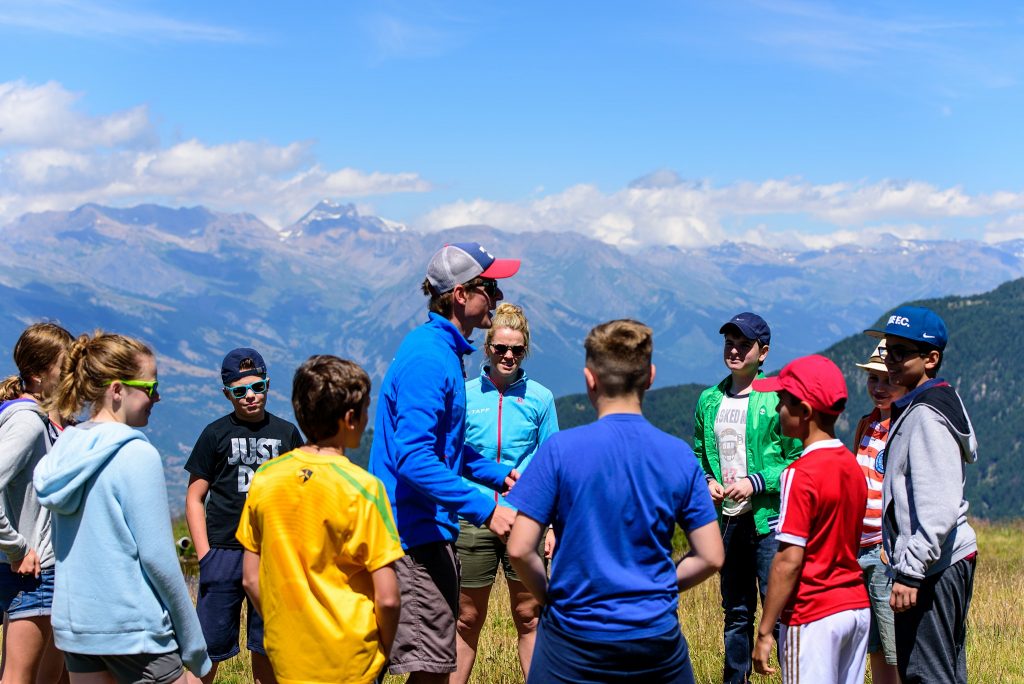
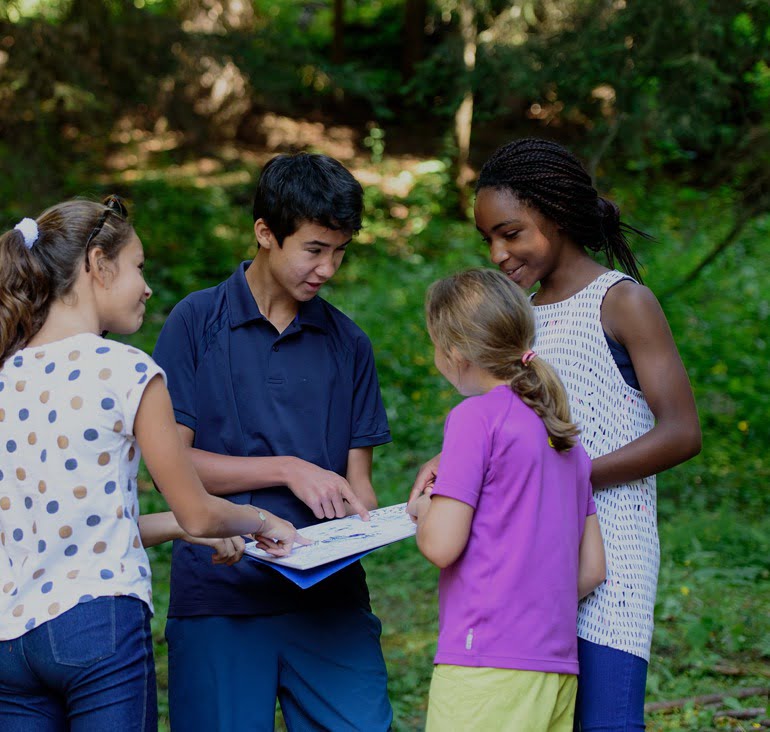
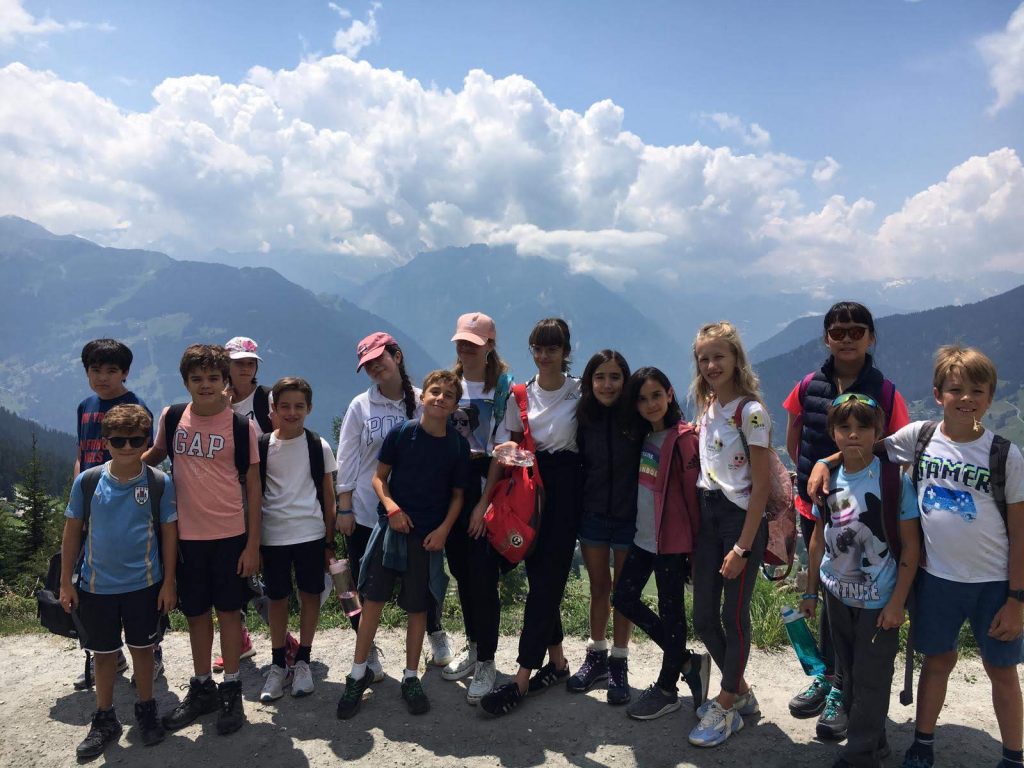
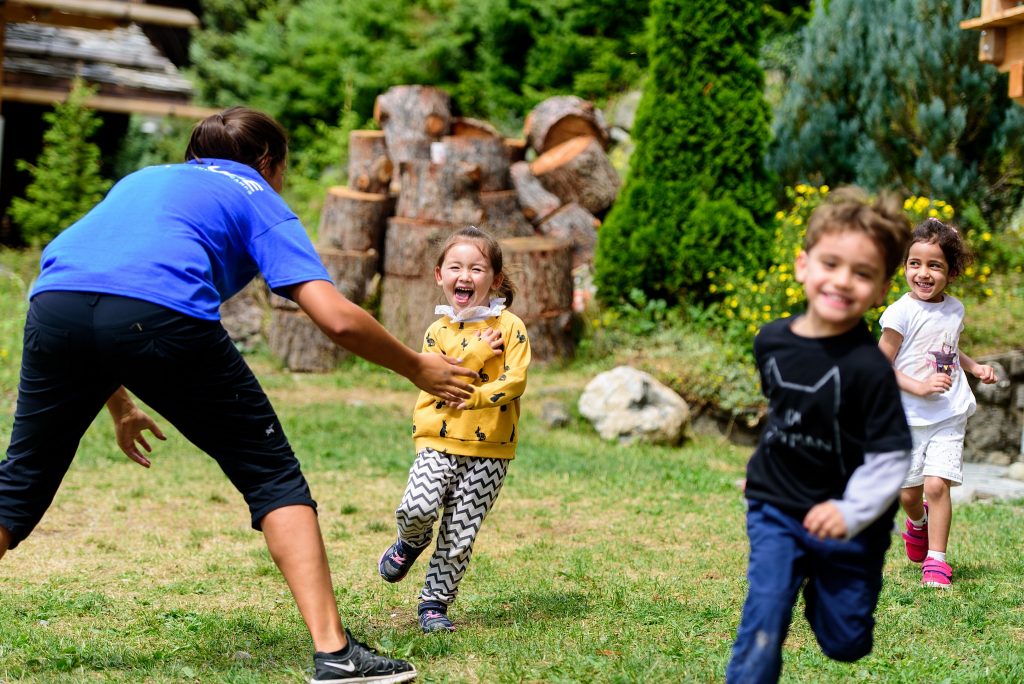
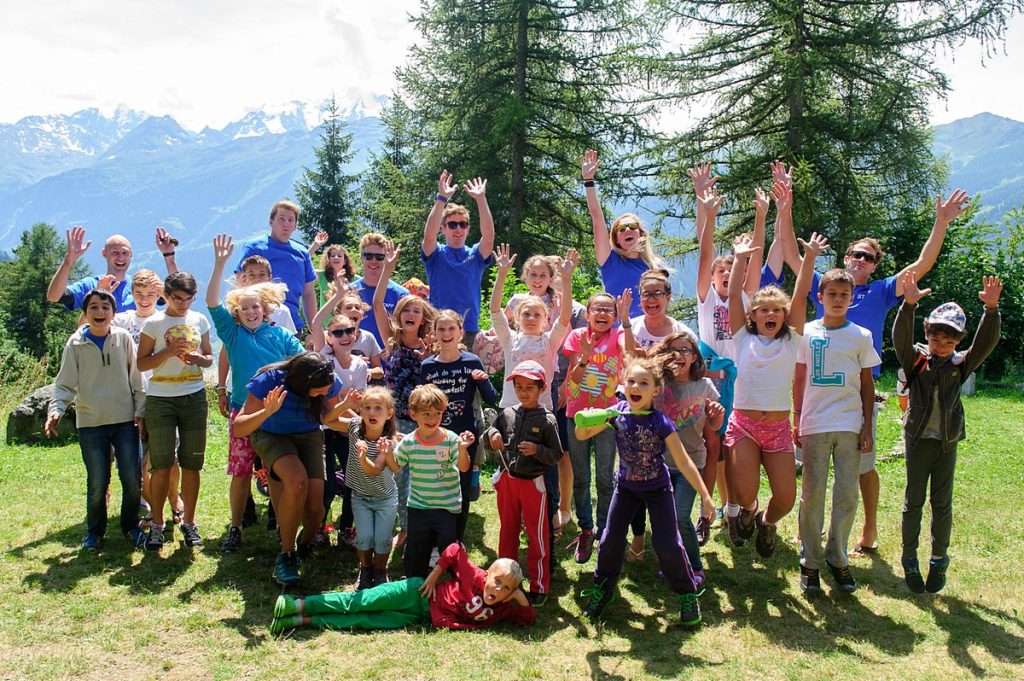
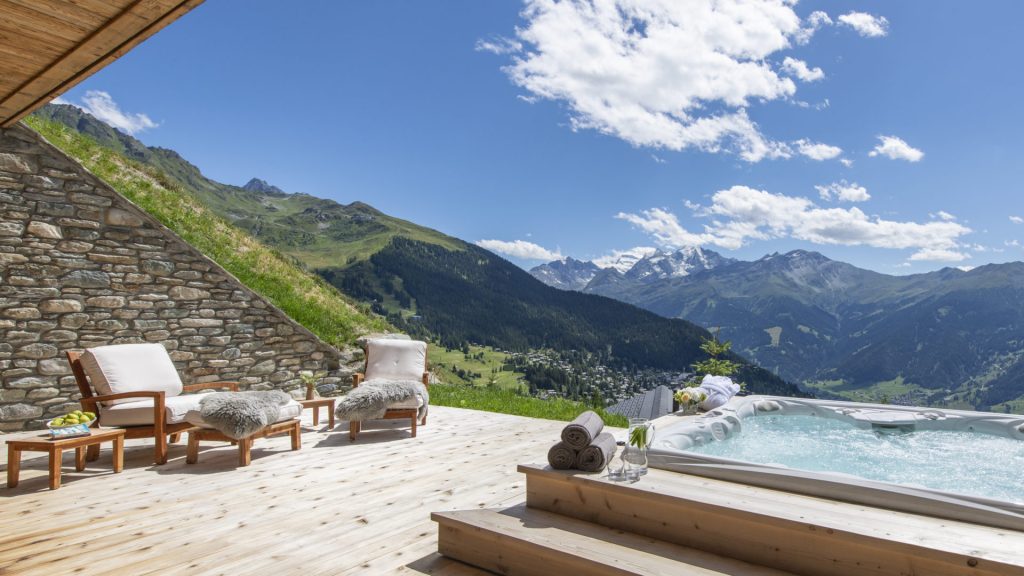 Close to Sonalon in the heights of Verbier, Chalet Calima is a beautiful four-bedroom property with magnificent mountain views, open plan living and incredible wellness facilities.
Astounding views can be enjoyed from the indoor pool which is equipped with a moveable floor to adjust the depth – ideal for children or nervous swimmers.
Floor-to-ceiling windows slide open onto a south-facing sunny terrace with outdoor hot tub – the perfect spot to unwind.
Close to Sonalon in the heights of Verbier, Chalet Calima is a beautiful four-bedroom property with magnificent mountain views, open plan living and incredible wellness facilities.
Astounding views can be enjoyed from the indoor pool which is equipped with a moveable floor to adjust the depth – ideal for children or nervous swimmers.
Floor-to-ceiling windows slide open onto a south-facing sunny terrace with outdoor hot tub – the perfect spot to unwind.
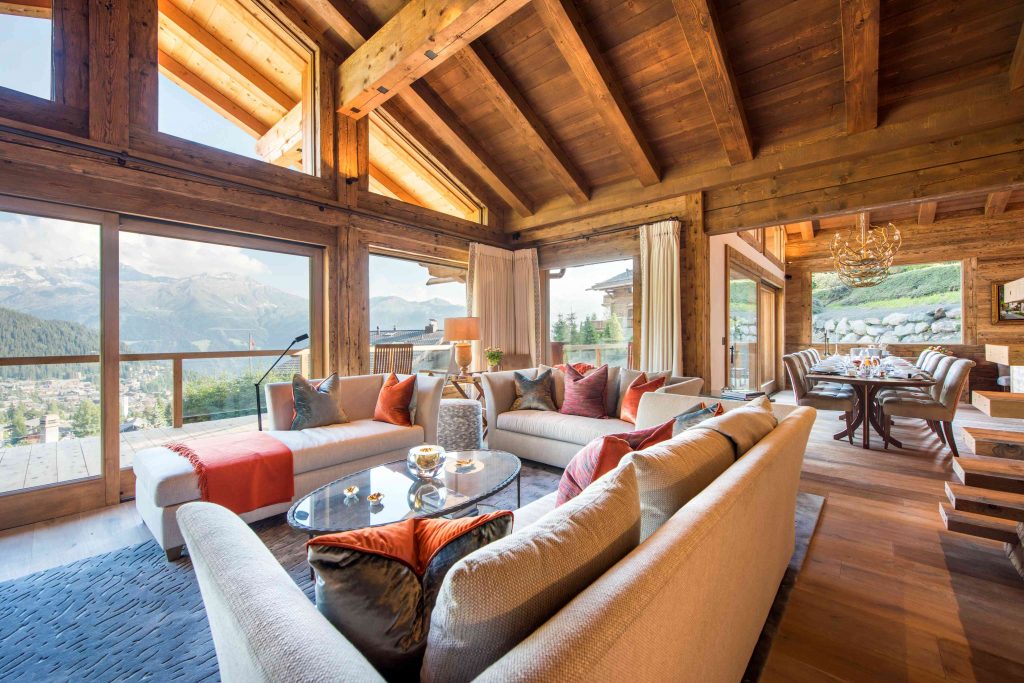 In a private location just a short drive from Savoleyres and the resort centre, Chalet Les Etrennes provides a peaceful setting for a summer holiday.
With six en-suite bedrooms and four floors of luxury living, there is plenty of room to spread out, relax and enjoy the incredible panoramic views.
From the light and spacious living room on the top floor to an outdoor hot tub in the garden, this family-friendly chalet is a true home away from home.
In a private location just a short drive from Savoleyres and the resort centre, Chalet Les Etrennes provides a peaceful setting for a summer holiday.
With six en-suite bedrooms and four floors of luxury living, there is plenty of room to spread out, relax and enjoy the incredible panoramic views.
From the light and spacious living room on the top floor to an outdoor hot tub in the garden, this family-friendly chalet is a true home away from home.
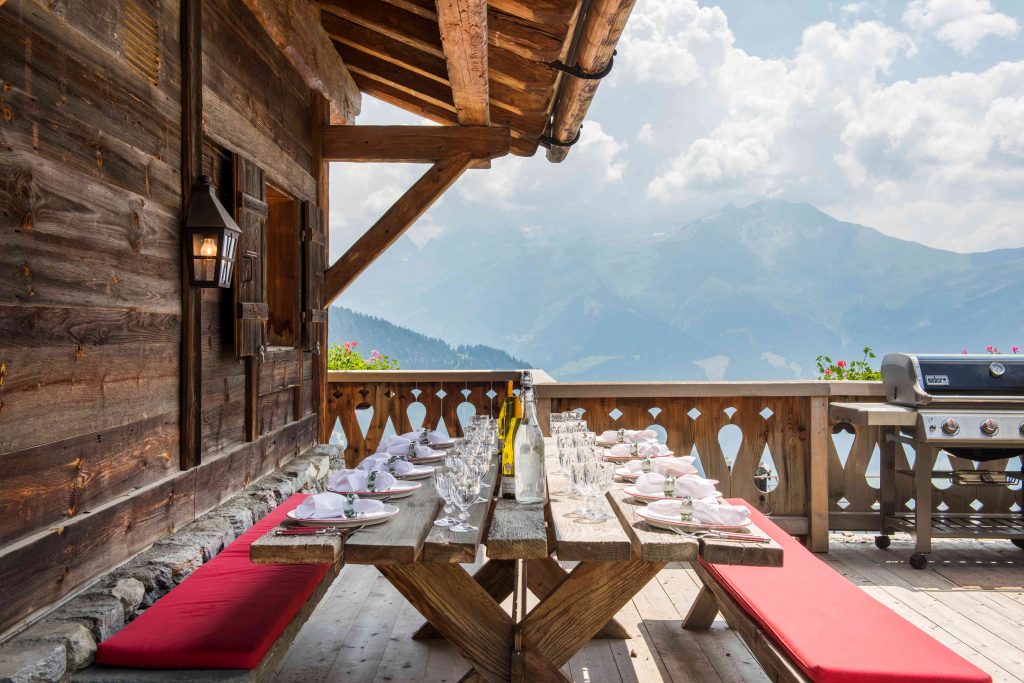 Perched above the village in the Sonalon area of Verbier, Chalet Nyumba offers commanding views across the valley, alpine-themed decor and facilities to keep the whole family entertained.
The children will be happy with a playroom equipped with countless toys and games as well as a cinema room with an extensive DVD library.
Parents can relax in the lavish spa which includes an ‘L’ shaped swimming pool with adjustable depth and counter current, outdoor hot tub, plunge pool, hammam and sauna. Adjoining the chalet is a self-contained guest mazot – ideal for any staff.
Perched above the village in the Sonalon area of Verbier, Chalet Nyumba offers commanding views across the valley, alpine-themed decor and facilities to keep the whole family entertained.
The children will be happy with a playroom equipped with countless toys and games as well as a cinema room with an extensive DVD library.
Parents can relax in the lavish spa which includes an ‘L’ shaped swimming pool with adjustable depth and counter current, outdoor hot tub, plunge pool, hammam and sauna. Adjoining the chalet is a self-contained guest mazot – ideal for any staff.
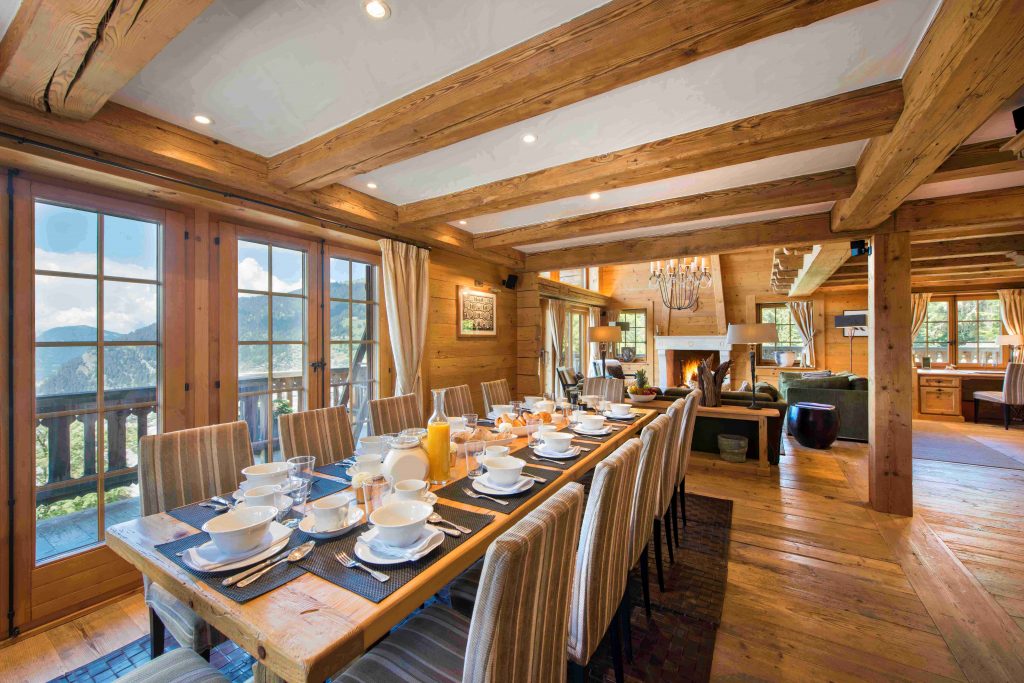 Located on Chemin de Clambin, Chalet Milou has a traditional rustic feel yet has been updated to include many contemporary comforts.
With far-reaching views across the valley, several lounges to relax and socialise together in and an outdoor hot tub, this six-bedroom chalet has everything you need to enjoy a summer holiday in the Swiss Alps.
Located on Chemin de Clambin, Chalet Milou has a traditional rustic feel yet has been updated to include many contemporary comforts.
With far-reaching views across the valley, several lounges to relax and socialise together in and an outdoor hot tub, this six-bedroom chalet has everything you need to enjoy a summer holiday in the Swiss Alps.
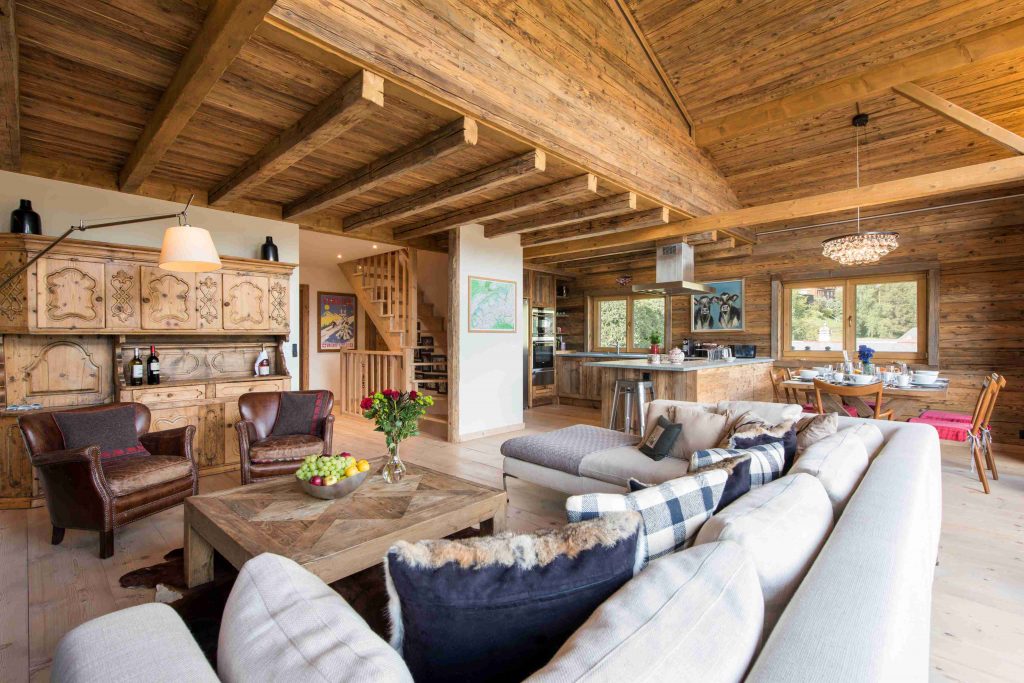 Situated on the south-facing side of Verbier close to Savoleyres, Chalet Toundra is a superb property sleeping up to 10 guests.
Combining fantastic views with an alpine-inspired interior, the chalet has a laid-back feel with a wrap-around balcony for soaking up the sun.
The children’s bunk room is a total delight and there are a further three tastefully-appointed double bedrooms to choose from.
To enquire about renting a luxury chalet in Verbier this summer ask the Altitude Team when booking your camp, or contact
Situated on the south-facing side of Verbier close to Savoleyres, Chalet Toundra is a superb property sleeping up to 10 guests.
Combining fantastic views with an alpine-inspired interior, the chalet has a laid-back feel with a wrap-around balcony for soaking up the sun.
The children’s bunk room is a total delight and there are a further three tastefully-appointed double bedrooms to choose from.
To enquire about renting a luxury chalet in Verbier this summer ask the Altitude Team when booking your camp, or contact